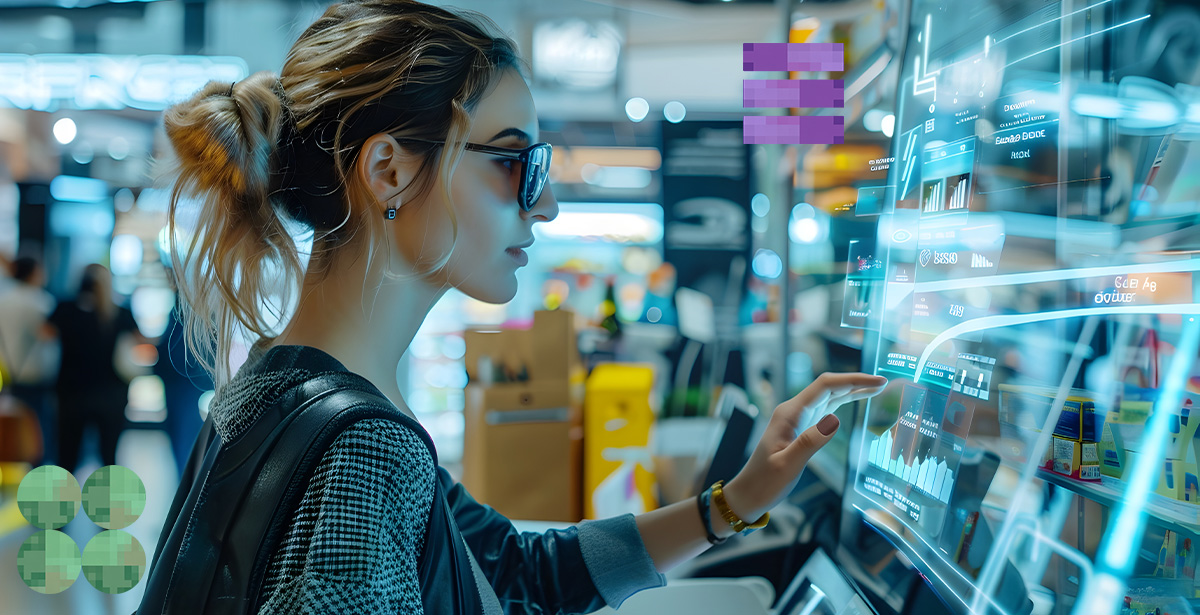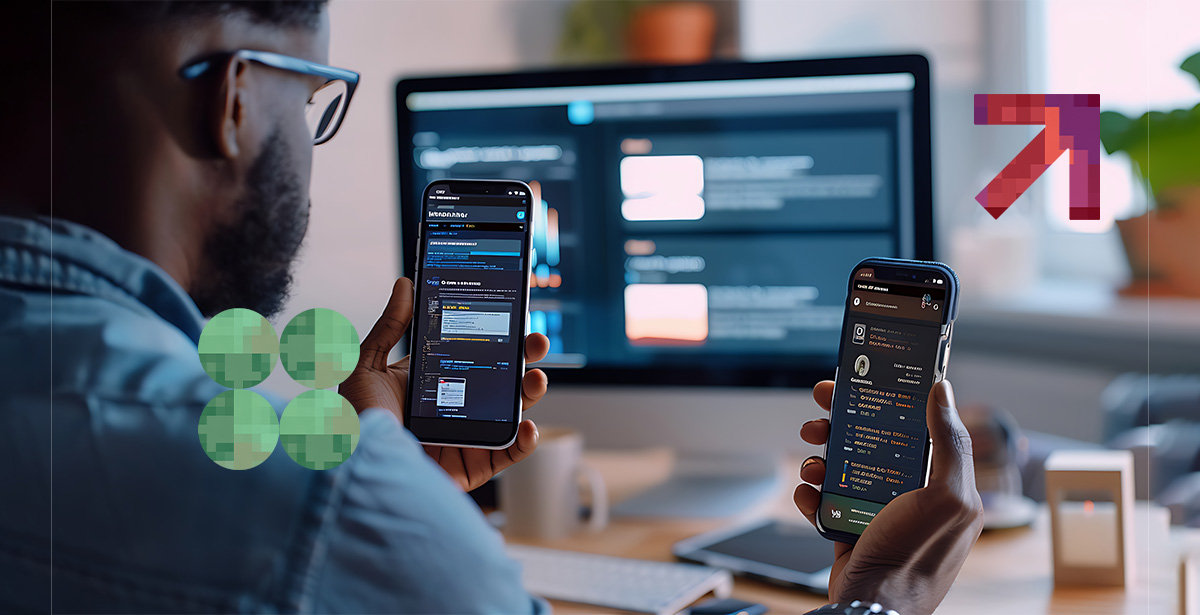9 Innovative Ideas for Your Next Retail Software Development Project

Retail is changing faster than ever. Lockdowns pushed online carts into mainstream life, and customers now expect a blend of digital speed and in-store ease.
For retailers, that means your systems need to do more. That too while ensuring more speed, efficiency, and power.
So, you shouldn’t be building just another app. You need to be building a backbone that supports inventory, checkout, marketing campaigns, employee tools, and vendor integrations. And you need retail software development that delivers impact, now and in the future.
Here are nine smart ideas that go beyond the basics to tackle common retail pain points and deliver real business value.
1) Cloud and Mobile POS
The idea here is to bring the checkout to the customer. Remember lines at registers? Cloud and mobile POS systems eliminate that.
Staff can process sales from anywhere, on the floor, at events, even curbside.
This means your team spends less time behind a counter and more time selling. Prices update instantly and the inventory syncs across stores in real time. And during peak hours or promotions, your checkout never crashes under pressure.
Retail brands investing in custom retail softwareoften see conversion rates rise by up to 15%, thanks to fewer bottlenecks. And backend efficiency improves too, meaning fewer errors, more accurate stock data.
In North America, shipments of mobile POS devices are scaling rapidly according to a June 2025 report as Tier I retailers embrace mobile-first checkout systems.
That’s smart retail software development services in action.
💡 Cloud and mobile aren’t the only things that can push your retail business forward. There are many modern technologies that you can incorporate in your eCommerce growth strategy. And with them, you can create seamless, data-driven shopping experiences that drive conversion, loyalty, and long-term growth.
2) Virtual Shopping Assistant
This is basically Siri, but for shopping. A virtual assistant via chat, voice, or web that guides customers through product choices, size questions, and checkout all in one flow.
For shoppers, it means no bouncing between pages. Moreover, their experience feels personal, making them act fast and not abandon their carts.
As for you, it translates into no extra staffing. And the data you collect will guide your team on what people ask and where they hesitate. That way, you can uncover smarter merchandising and better upselling methods.
Most importantly, personalization will positively impact your bottom line. A 2025 McKinsey study confirms that personalization initiatives can generate 5–8× ROI and boost sales by around 10%.
Some retailers already use assistants that remember a user’s style and recommend items. This is driving a 20% increase in average order value. In fact, Salesforce reports that 69% of consumers prefer to use chatbots for quick communication with brands.
That’s the payoff of developing retail software development that learns to help.
3) Personalized Shopping Experience
No two shoppers want the same thing, so why offer them the same homepage?
Personalization goes beyond “Customers also bought.” With the right software, you can tailor product displays, promo offers, and even site navigation based on past behavior, demographics, or loyalty data.
Done right, personalization increases time on site and reduces bounce. More importantly, it builds loyalty. Shoppers feel seen. And that translates into sales. McKinsey found that personalization can deliver five to eight times the ROI on marketing spend and lift sales by 10% or more.
This is one of the most requested features in custom retail software development today, especially among direct-to-consumer brands looking to stand out.
4) IoT Inventory Management
IoT in inventory isn’t futuristic anymore. This one-of-a-kind solution is changing the entire retail software infrastructure via smart shelves, connected tags, and real-time updates.
Sensors track stock levels automatically, so you know what’s running low and need to restock before it sells out. You can also monitor perishable goods, get alerts when items are misplaced, and improve overall warehouse efficiency.
For multi-location retailers, this means fewer stockouts and less overordering. It also creates a single source of truth for inventory, which is key when syncing physical and digital storefronts.
According to industry forecasts, over 80% of retailers are aiming to deploy IoT inventory tracking by 2025. And you should do too if you want the ROI from reduced waste and higher customer satisfaction.
5) AI Chatbots for eCommerce
Chatbot tech is booming now with retail using it for everything from support to sales. In fact, it’s valued at $10.3B in 2025 and set to nearly triple by 2029.
Chatbots handle the questions your team can’t get to. Shipping status? Return policies? Product availability? All done instantly, even at 2AM.
The best bots now feel human. They’re trained on customer data, speak in brand voice, and connect to your back-end to pull live info. And when they hit a wall, they pass off the query to a human rep seamlessly.
If your support team is stretched thin or your site gets high traffic during promotions, a well-built chatbot is one of the fastest upgrades you can make.
🔥 Hot tip! With so much to offer for your business, don’t settle for generic chatbot builders. Invest in custom AI chatbot development services for skilled bots that understand context, adapt to user intent, and learn over time. And unlike rigid, rule-based bots, your custom chatbots deliver smarter conversations, automate complex workflows, and provide real ROI through better engagement and support.
6) AI-Powered Marketing Solutions
Marketing used to be spray and pray. Today, AI lets you build campaigns that actually convert. Especially with the help of predictive tools that analyze past purchases and browsing habits. Based on their output, you can time emails, set prices, and recommend products automatically.
Marketing solutions that utilize AI also help teams run A/B tests at scale and forecast trends. So, instead of guessing, you’re optimizing and saving ad spend.
This is especially effective in omnichannel setups, where syncing web, app, and in-store behavior requires tight data loops.
You also get to improve ROI and customer targeting within the first year of deploying such solutions. A 2025 report by Deloitte confirms this, stating that over 68% of retail brands using AI-driven marketing tools reported such benefits.
💡 Retail software development companies across Tampa and the US now offer AI toolkits as standard in modern eCommerce stacks. And for good reason. These built-in tools can power everything from personalized product recommendations to smart search, dynamic pricing, and even automated customer support. So, make sure to work with your development partner to actively configure and customize these features for your specific audience and inventory.
7) Subscription Tracking App
Subscriptions are sticky; managing them is not always simple. Without the right tools, tracking renewals, upgrades, cancellations, and billing can strain operations, impact retention, and create friction in customer experiences.
A custom app that lets users pause, skip, or modify subscriptions improves retention instantly. Plus, you get to avoid angry cancellations and build longer-term loyalty.
These tools also give you a better view of churn risk and product popularity. According to a 2025 Statista report, subscription-based retail apps that include personalized management options saw a 22% decrease in monthly churn rates compared to those that didn’t.
That’s why more brands are treating subscription management as core UX and not just as a back-office chore.
💡 Get inspired by some of the best subscription trackers out there. Local Tampa retailers and shoppers alike prefer Rocket Money, Trim, and Bobby. And each of these is already on CNBC’s list of best subscription trackers for 2025.
8) Vendor Management Systems
Retail doesn’t run on shelves alone. Vendors, wholesalers, and logistics partners are the real engine.
Vendor management software helps retailers centralize contracts, performance tracking, and communications. This translates into no more lost invoices or missed delivery SLAs.
These systems also improve forecasting. When you know your supplier’s lead time and reliability score, you can plan smarter. This becomes essential as retail supply chains stretch across borders.
Investing in this kind of custom retail software development solutions reduces risk and improves margins over time.
9) Innovative Employee Management Tools
Your team runs the show, and it’s time to give them tools that work.
Modern staff management tools do more than log hours. They automate shift planning, give performance feedback, and even integrate training modules.
Retailers using these apps report higher employee satisfaction and smoother store ops. Some even gamify productivity to keep morale up.
It’s a low-cost, high-impact area of retail software that gets overlooked too often.
Let’s Build What’s Next
Smart retail is software-driven. Whether you’re scaling a D2C brand, launching new stores, or integrating your eCommerce with warehouses and vendors, the right tools make all the difference.
DPL builds bold, stable, future-ready platforms that serve every part of your stack. From POS to personalization, AI to analytics, we help retailers innovate without the headache.
Reach out to explore how our retail software development team can support your next move. Whether you’re starting from scratch or scaling something great, we’ll help you make it seamless.





